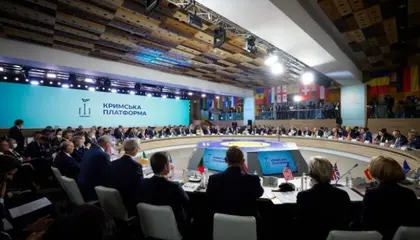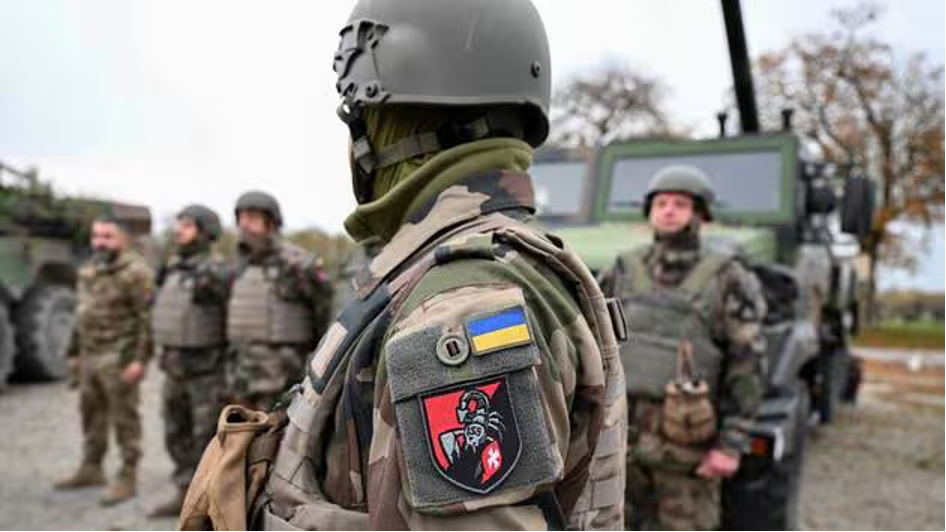On Oct. 24 in Prague, the second parliamentary summit of the Crimean Platform brought together almost 70 representatives from parliaments the world over, along with other influential organizations. The summit was chaired by Verkhovna Rada Speaker Ruslan Stefanchuk and Speaker of the Chamber of Deputies of the Czech Parliament Marketa Pekarova Adamova.
In her opening speech, Adamova announced the creation of a parliamentary support group, while the head of the Verkhovna Rada declared that without the restoration of the territorial integrity of Ukraine, including Crimea, there will be no stable or just peace – for Ukraine and the wider world.
JOIN US ON TELEGRAM
Follow our coverage of the war on the @Kyivpost_official.
Ukraine’s delegation consisted of more than 10 parliamentarians from different parties and groups, joined in unison on the need to de-occupy the Ukrainian Crimea peninsula. Among them was lawmaker Yevheniya Kravchuk from the Servant of the People party.
In exclusive comments to Kyiv Post, Kravchuk spoke about this year's composition of the Ukrainian delegation, the main tasks ahead, and the importance of the Crimea Platform’s activities at interparliamentary level.
Why is the work of the Crimea Platform at the interparliamentary level important?
The Crimea Platform works in different dimensions. It has already been held three times at the government level, at the level of President Volodymyr Zelensky We are meeting at the parliamentary level for the second time. The first summit was held in Zagreb in 2022.

Ukraine Investigates Military Commander Abuse, Lawmakers Criticize Corruption and Delays
About 70 delegations from national parliaments and interparliamentary assemblies have confirmed their participation, including the presidents of PACE, the OSCE Parliamentary Assembly, the NATO Parliamentary Assembly, and the vice-president of the European Parliament. Representatives of more than 50 countries are taking part in person – mostly speakers or vice-speakers of parliaments.
This makes it possible, in addition to common panels, discussions, welcoming words and the adoption of the general declaration of the summit, to hold bilateral meetings. Last night. we had a joint meeting with the President of the Czech Republic Petr Pavel, and today the main part of the parliamentary summit of the Crimean Platform is taking place. Among the events is an expert discussion in which representatives of the Ministry of Foreign Affairs, the representation of the President of Ukraine in the Autonomous Republic of Crimea, and, of course, the President's Office, will take part.
This is an opportunity to discuss not only the issue of Crimea, but also the five priority areas of the Crimea Platform – the illegitimate Russian occupation of Crimea, its negative impact on the human rights of the local population, security in the Black Sea region, as well as economic and environmental consequences of temporary Russian occupation of the peninsula.
What has changed since the first parliamentary summit?
Significant changes have taken place in the area of navigation security.
Ukraine has managed to independently secure the grain corridor. Since September, more than 30 ships with Ukrainian food have left our ports and are heading to various countries, including African nations and the countries of the Global South.
And it is Ukraine, not having its own fleet, but creatively using drones and long-range missiles, that in fact drove Russian ships to a safe distance. I hope this grain corridor will continue to work.
In addition, we will appeal to other countries to continue to help Ukraine militarily and financially, as well as through sanctions against the Russian Federation.
Of course, we will talk a lot about Crimea. Such meetings should also be used in a wider context, in particular, during negotiations regarding the European and Euro-Atlantic integration of Ukraine.
On the topic of European integration, we expect a positive decision first by the European Commission in October-November, and then by the European Council in December on the opening of negotiations [on Ukraine's accession to the EU].
Parliamentarians can in a good sense put pressure on their governments and call on them to support Ukraine, to open these negotiations.
And, of course, in the case of Ukraine's membership of NATO, parliamentarians in any country are always freer in their statements, so we expect their advocacy in this matter.
You can also highlight the text and press Ctrl + Enter






